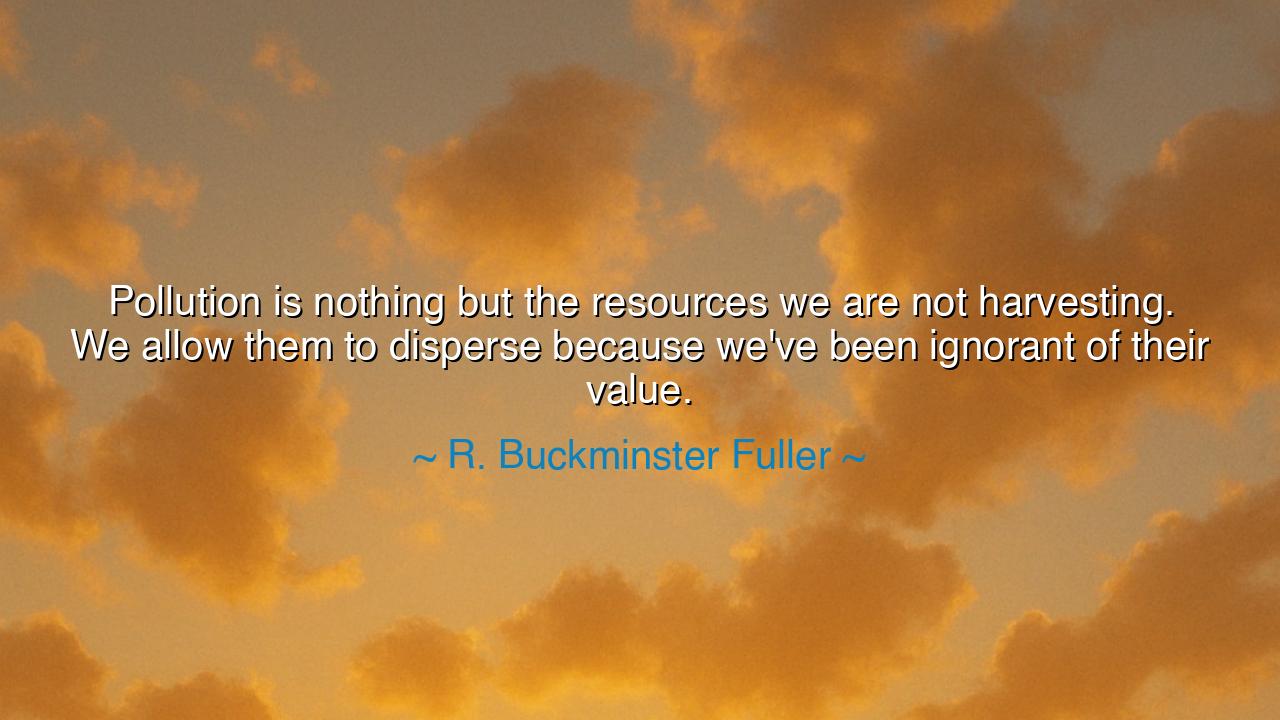
Pollution is nothing but the resources we are not harvesting. We
Pollution is nothing but the resources we are not harvesting. We allow them to disperse because we've been ignorant of their value.






R. Buckminster Fuller, visionary architect of possibility and prophet of a sustainable future, once declared: “Pollution is nothing but the resources we are not harvesting. We allow them to disperse because we've been ignorant of their value.” In this startling reversal, he redefined pollution not as mere waste, but as squandered wealth, a treasure unrecognized. To Fuller, the rivers choked with chemicals, the skies heavy with smoke, and the heaps of refuse were not signs only of destruction but of blindness: mankind’s failure to see the hidden value within what was cast aside.
The origin of this truth lies in Fuller’s tireless quest to design a world of abundance through intelligence rather than exploitation. As inventor of the geodesic dome and advocate for renewable energy, he sought ways to use resources efficiently, believing Earth to be a vessel with enough for all if men only used it wisely. Pollution, to him, was proof not of scarcity but of ignorance—evidence that humanity had not yet learned to capture energy, matter, and processes in harmony with nature’s design.
History gives many examples of this blindness later overturned by wisdom. In the early Industrial Revolution, smoke from coal was seen only as filth, blackening the skies of London. Yet within that smoke lay unused energy—heat and carbon—that, had it been captured, could have fueled rather than fouled. Later ages learned to harness gases, recycle metals, and reclaim waste, turning what was once pollution into new wealth. Fuller’s words remind us that what is despised today may be treasure tomorrow.
So too with sewage, once regarded only as poison. Cities dumped it into rivers, sickening their people. But when chemists learned to reclaim nutrients from it, sewage became fertilizer, a source of life for fields. What was once deadly became fruitful, proving Fuller’s vision: pollution is not the end of value, but the sign of value overlooked.
Therefore, O seekers of wisdom, let this lesson be carved upon your hearts: the Earth holds no true waste, only processes we have not yet learned to understand. Pollution is ignorance, not destiny. The wise will see in every stream of smoke, every heap of refuse, the seeds of new creation. To heal the Earth is not merely to stop defilement, but to learn its hidden value, to transform what was cast off into sustenance for all. For in the eyes of wisdom, even waste is wealth awaiting discovery.






TVThi Thoa Vu
Buckminster Fuller's idea here is revolutionary. If pollution is simply a resource we've neglected, then perhaps there's an opportunity to redesign industries and systems to use waste in smarter ways. This makes me wonder, are we doing enough to find sustainable solutions to the growing environmental crisis? How can we move from treating pollution as an inevitable problem to seeing it as a resource we can harvest, repurpose, and utilize?
BMBUNs Music
This quote is a reminder of the disconnect we often have with nature and the resources around us. The idea that pollution is actually valuable is eye-opening. Maybe if we understood the real value of natural byproducts and waste, we could find innovative ways to turn pollution into something useful. But does that mean we would need to completely rethink our entire approach to waste management and industrial processes?
TKhoang tung kinh
I find this quote really striking because it suggests that our current environmental problems are rooted in ignorance. Pollution is not just an unavoidable byproduct of modern life; it's a failure to recognize the value in what we throw away. Could this perspective change the way we approach sustainability? If we treated resources like plastic waste or carbon emissions as something we could harvest, how would our industries and technologies evolve?
TTVu Tri Thanh
This quote makes me think deeply about how we view pollution. Instead of seeing waste and pollution as just something harmful, what if we viewed it as untapped potential? There’s a lot of talk about recycling and reducing waste, but maybe we should be looking at pollution as a resource to be harnessed. How can we change our mindset and start focusing on ways to harvest what we now consider ‘pollution’?